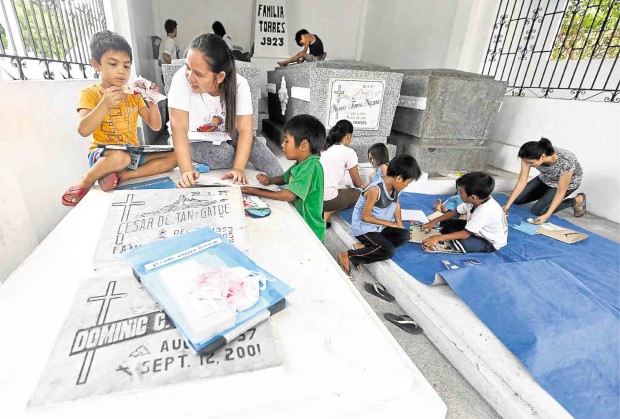
CALL IT a “home-schooling” of sorts. Children living at the Manila North Cemetery attend summer classes courtesy of All Together in Dignity, a nongovernment organization which has been conducting Ang Galing literacy classes for kids. Graves serve as both tables and chairs for the children who are taught to read and write. No complaints so far from the relatives of the departed who approve of the program while teachers and students make sure to clean up after themselves.
PHOTOS BY Lyn Rillon
Seven-year-old “Maria” stood out among her classmates as she read out a storybook with confidence and only a few mispronounced words. The teacher nodded approvingly, having delivered the day’s lessons. Outside, the trees swayed gently in the afternoon wind.
But everything else was different about this “summer class.” For one, it was held not on a typical campus—but in a neighborhood of tombs.
Maria was one of the children whose families live among the dead at Manila North Cemetery (MNC), where a series of reading and writing sessions was recently conducted by a nongovernment organization that offers a basic literacy program for shantytown kids.
“I’m actually a graduate by now,” the girl said when the Inquirer saw her last week in a class held at the Familia Torres mausoleum, which was spacious enough to accommodate 30 pupils.
The volunteer teachers and the learning materials were courtesy of All Together in Dignity (ATD) Fourth World Philippines, a member of an international NGO network devoted to helping grassroots communities overcome poverty. Its local headquarters was established in Pandacan in 1989.
With roots traceable to 1950s Paris and currently active in 34 countries, ATD Fourth World chooses to work in areas “where other NGOs don’t usually go,” according to Guy Malfait, the group’s Belgian director who has been living in country for the last two years.
First classes
Under its Ang Galing literacy program for Filipino children, the first classes were conducted for indigents kids in Paco in 2011. Two years later, the project targeted youngsters who were taking shelter under Quirino Bridge also in Manila.
This year, the program came to MNC, a sprawling public cemetery managed by the city government. According to the administration office, about a thousand people are currently taking up spaces amid the graves, many of them employed as caretakers by relatives of the deceased.
In the first four years, Ang Galing classes were held on Saturdays, from June to March, to supplement the children’s schooling. This year, Malfait said, they decided to start a two-week, six-session summer program to help boost the kids’ confidence to enroll again in school.
Many of the students’ mothers and grandmothers have since been enticed to help in the program, some as instructors. At the MNC, one of the 15 volunteers for the summer class was Lillian Tiglao, 59, whose two granddaughters were in the batch.
“I was taking up education in what was then Philippine Normal College but reached only the second year,” Tiglao said. “It feels good to be able to help the children this way.”
Another grateful volunteer is 67-year-old Tita Villarosa, who for the last 20 years has looked after around 60 graves at Manila North. She learned about ATD long before the NGO brought its literacy project to the cemetery.
“At first I didn’t even want to get involved. But my daughter, who was only 11 at the time, got interested—and soon I was, too,’’ said Villarosa who, like Tiglao, described herself as a “frustrated teacher.”
Off to New York
Villarosa got so involved in the ATD activities that she achieved something probably beyond the wildest dreams of a cemetery dweller: She became part of a Philippine delegation that went to New York City for the International Day for the Eradication of Poverty in 2005 and met with then UN Secretary General Kofi Annan.
With the graves serving as their chairs and tables, the pupils are also given puzzles, simple math problems and white boards for drawing. “Sometimes we have to go through another process to guide them to what we want them to learn, which is really to read and write. Puzzles, for example, exercise their patience, which they need so they can learn,” Malfait said.
“It’s important that we engage them enough to encourage them to come back,” Ang Galing coordinator Mae Ann Reginaldo further explained.
All the instructional materials are in Filipino since “it’s the language the children use at home,” said Malfait, who can also converse in the local tongue. “We want them to be able to learn faster, and it would be difficult to do that with English since it’s not what they normally use.”
Asked if they have received any complaints from relatives of the dead on whose graves they hold classes, Reginaldo said “they are actually supportive of what we do since it’s about the kids’ education.’’